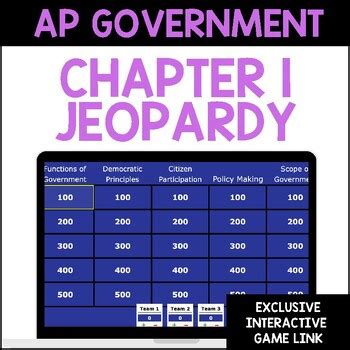Introduction:

Are you ready to put your AP Government knowledge to the test? Embark on an exciting game of Jeopardy! and prove your mastery of the intricacies of American politics.
Categories:
- Constitutional Underpinnings
- Federalism and Intergovernmental Relations
- Political Ideologies
- Political Institutions
- Political Processes
Constitutional Underpinnings
Answer: The fundamental principles upon which the U.S. Constitution is based. (What are constitutional underpinnings?)
Answer: The idea that all individuals have certain fundamental rights that cannot be infringed upon. (What is limited government?)
Answer: The principle that the government’s power is divided among different branches. (What is separation of powers?)
Answer: The process by which the Constitution can be amended. (What is amendment?)
Answer: The idea that the Constitution is supreme and all other laws must conform to it. (What is judicial review?)
Federalism and Intergovernmental Relations
Answer: The system of government where power is divided between the central (federal) government and the state governments. (What is federalism?)
Answer: The powers explicitly granted to the federal government. (What are enumerated powers?)
Answer: The powers that are not explicitly granted to the federal government but are necessary to carry out its enumerated powers. (What are implied powers?)
Answer: The idea that the federal and state governments share power and responsibilities. (What is cooperative federalism?)
Political Ideologies
Answer: The set of beliefs about the role of government and the relationship between individuals and the state. (What are political ideologies?)
Answer: An ideology that emphasizes the role of free markets, limited government interference, and individual liberty. (What is conservatism?)
Answer: An ideology that advocates for a strong government, social equality, and economic redistribution. (What is liberalism?)
Answer: An ideology that promotes the abolition of capitalism and the establishment of a socialist society. (What is socialism?)
Political Institutions
Answer: The branch of government that makes laws. (What is the legislature?)
Answer: The branch of government that executes laws. (What is the executive?)
Answer: The branch of government that interprets laws. (What is the judiciary?)
Answer: A representative body that makes laws and represents the interests of the people. (What is a legislature?)
Answer: The highest court in the United States. (What is the Supreme Court?)
Political Processes
Answer: The process by which citizens select their representatives and participate in government. (What is electoral politics?)
Answer: The process by which political candidates compete for votes and seek to gain office. (What is campaigning?)
Answer: The process by which citizens influence government decisions by lobbying, protesting, or other means. (What is political participation?)
Answer: The process by which political parties compete for power and influence government policies. (What is partisanship?)
Answer: The process by which individuals or groups seek to influence government decisions by offering financial or other support. (What is lobbying?)
Table 1: Levels of Government in the United States
| Level of Government | Examples | Functions |
|---|---|---|
| Federal | United States | Defense, foreign policy, regulation of commerce |
| State | California, New York | Education, law enforcement, transportation |
| Local | Cities, counties | Zoning, public services, law enforcement |
Table 2: Branches of Government
| Branch | Functions |
|---|---|
| Legislative | Makes laws |
| Executive | Enforces laws |
| Judicial | Interprets laws |
Table 3: Political Ideologies
| Ideology | Beliefs |
|---|---|
| Conservatism | Limited government, free markets, individual liberty |
| Liberalism | Strong government, social equality, economic redistribution |
| Socialism | Abolition of capitalism, establishment of a socialist society |
Table 4: Political Processes
| Process | Description |
|---|---|
| Electoral politics | Citizens select representatives and participate in government |
| Campaigning | Candidates compete for votes |
| Political participation | Citizens influence government decisions |
| Partisanship | Political parties compete for power |
| Lobbying | Individuals or groups seek to influence government decisions by offering support |
Conclusion:
Congratulations, you have conquered the Jeopardy! AP Government challenge! Your impressive knowledge of American politics is a testament to your dedication and understanding of this complex subject. Keep exploring the fascinating world of government and continue to expand your political literacy.
